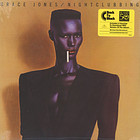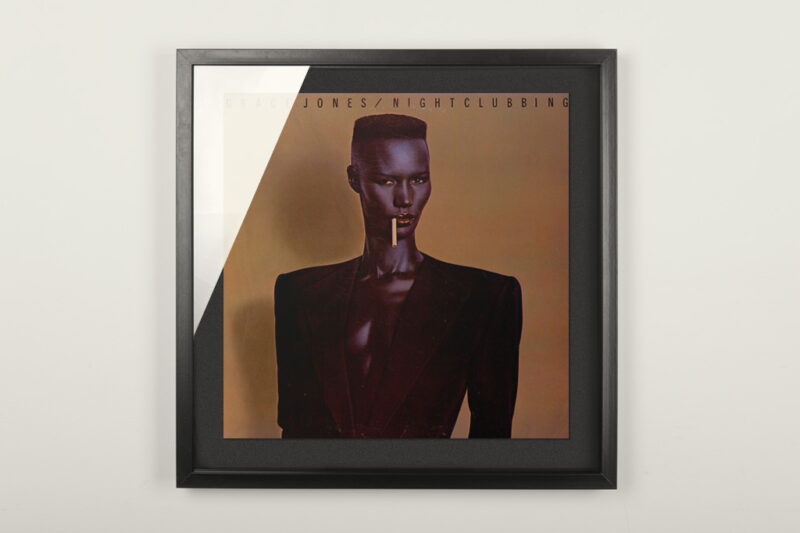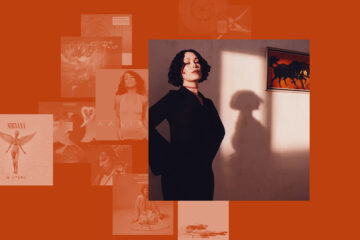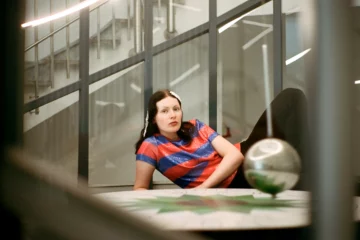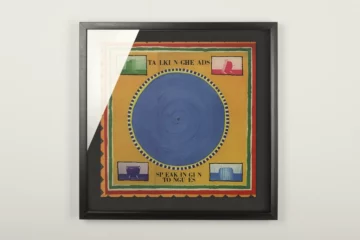As a child, chances were that the woman on the cover would scare you a little. An exact angular crew cut, a metallic lustre on the skin, a padded jacket, and then this look over the cigarette in her mouth which seems to be saying: stay away from me. Not exactly a kind invitation, more like »Enter at your own risk«. Something that can be fascinating in its own right. Especially for people with a soft spot for science fiction: on »Nightclubbing«, Grace Jones looks a bit like an android.
Her voice, too, triggers similar responses. Her intonation is rather harsh than soft, no matter if she is speaking or singing. ‘Feeling like woman / Looking like a man’, she proclaims in the opening song ‘Walking in the Rain’. However, one may ask whether the inverse might not hold true for Grace Jones just the same.
»Nightclubbing«, released in 1981, was the singer’s fifth album. It saw her continuing the fusion of new wave, funk, and reggae she had begun on ‘Warm Leatherette’ the year before. Again she would trust the bass player Robbie Shakespeare and the drummer Sly Dunbar with the foundation work, the duo having a reputation for being the best rhythm section in reggae.
Since 1977, Sly and Robbie had been affiliated with the Compass Point All Stars, the session band put together by Chris Blackwell, the founder of Island Records, for his Compass Point Studio in Nassau, Bahamas. The sound this ensemble produced for Grace Jones, when listened to today, may come across as fairly ‘normal’. Back then, it did not.
The Jamaican-born Grace Jones had initially started making disco before moving on to integrate reggae into her music. She was not the first one in this. New wave band such as Bauhaus had already shown an interest in dub, and reggae had found its way into pop music via punk bands like The Clash or The Police.
However, Grace Jones did things in a slightly different way. In line with her self-staging, the music is produced in a cool, distant manner, including the elegant, technically flawless groove. Dancing to it is still very well possible, even if one risks slipping off the music’s surface.
The fact that »Nightclubbing« still sounds spirited today is, however, perhaps less thanks to Grace Jones’ performative pioneering work for the gender discourse, but rather because of the shifts in pop making themselves felt on the album.
Take, for instance, Jones’s cover version of the Astor Piazzolla classic ‘Libertango’ in which the reggae basis courtesy of Sly and Robbie is beamed into the future by means of spookily whirring synthesizers. The accordion providing for a more intimate tango mood later on, the Piazzolla reference aside, serves as a reminder that one was determined to do pop, after all.
And quite successfully so. »Nightclubbing« proved a breakthrough for Grace Jones and became her best-selling album to this day. Ironically, the lead single »Demolition Man« written by Sting flopped at first. Perhaps back then, its reduced new wave style was too abrasive for the taste of the masses. By contrast, the indestructible electrified boogie funk of »Pull Up to the Bumper« fared considerably better. Also, the lines »Pull up to my bumper baby / In your long black limousine / Pull up to my bumper baby / Drive it in between’ which caused a bit of a scandal at that time offer one of the loveliest examples of classy indecent lyrics in pop, last but not least due to the decidedly upfront play on a rather barmy image.
All in all, the carefree handling of explicit subject matter, which did not require the invention of a ‘Parental Advisory’ sticker then, fits perfectly well with the attitude of Grace Jones according to which she is not a feminist. Instead, she is a self-confident woman, ready to present herself as an object if needed, but always remaining a subject at the same time. Including the free dealing with gender roles.
The fact that »Nightclubbing« still sounds spirited today is, however, perhaps less thanks to Grace Jones’ performative pioneering work for the gender discourse, but rather because of the shifts in pop making themselves felt on the album. If the song structures might have seemed slightly repetitive to more conservative listeners at that time, today their nuanced richness of detail comes into its own so much the better. Also, the way in which Grace effortlessly merged genres that until then had mostly been traded separately, should prove equally forward-looking and enduring. And is there any other artist in pop music it would be more fun to be scared of?
